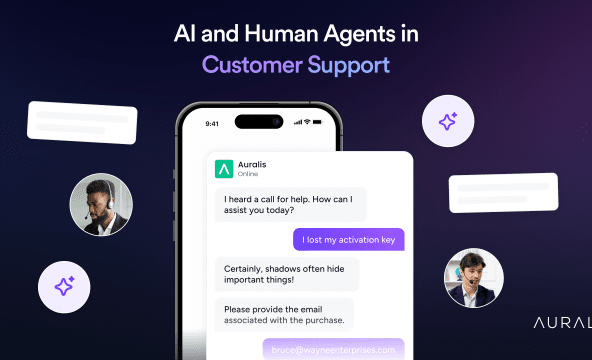AI-human collaboration
AI-human collaboration is a powerful and increasingly popular approach that combines the strengths of artificial intelligence with human expertise to create more efficient, innovative, and personalized solutions in various fields, including customer support. By leveraging AI’s ability to process vast amounts of data and perform repetitive tasks at scale, while tapping into the creativity, empathy, and critical thinking of humans, businesses can achieve a level of synergy that enhances both operational efficiency and customer experience.
In the context of customer support, AI-human collaboration enables support teams to be more responsive and efficient. AI can assist human agents by handling routine inquiries, providing instant responses, and performing simple tasks like ticket routing or data entry. This allows agents to focus on more complex, emotionally charged, or nuanced issues, where human intervention is crucial. By removing the burden of repetitive tasks, AI helps support teams work more efficiently, resolve problems faster, and provide a higher level of service.
One key benefit of AI-human collaboration is the ability to scale operations. AI tools, such as chatbots, can manage a high volume of inquiries simultaneously, ensuring that customers don’t have to wait for support. These AI systems can instantly handle basic questions or direct customers to the appropriate resources, while human agents are available for more sophisticated queries. This ensures that businesses can maintain quality support even during peak demand periods, without compromising the customer experience.
AI can also enhance the quality of support provided by human agents. Through machine learning and natural language processing, AI tools can analyze previous customer interactions and recommend the most relevant responses or solutions. This not only reduces the time agents spend searching for information but also ensures that customers receive accurate and tailored responses. AI can even assist agents in real time by providing them with additional context about a customer’s history or preferences, helping them personalize their interactions and resolve issues more efficiently.
Another significant advantage of AI-human collaboration is the ability to continuously improve customer service. AI systems can analyze large datasets and identify trends, pain points, or areas where customers frequently encounter issues. By providing businesses with actionable insights, AI enables companies to make data-driven decisions and optimize their support strategies. For example, AI might flag recurring problems with a particular product or service, prompting businesses to address these issues proactively. Additionally, AI can monitor agent performance and offer suggestions for improvement, helping teams refine their skills and improve overall support quality.
AI can also play a crucial role in enhancing the emotional intelligence of customer interactions. While AI can handle routine inquiries, human agents are still needed to navigate more delicate situations, especially when customers are frustrated or upset. Human agents can demonstrate empathy and understanding, offering personalized support that goes beyond the capabilities of AI. In cases where AI does not have the ability to fully resolve an issue or provide a satisfactory response, human agents can step in to take over and offer a higher level of emotional support.
However, for AI-human collaboration to be truly effective, businesses must ensure seamless integration between AI tools and human workflows. It’s important for companies to invest in AI systems that are user-friendly and designed to complement human skills. Training employees on how to work alongside AI tools is also critical. Support agents should feel empowered by the technology, using AI as a tool that enhances their work rather than replaces them. Providing ongoing training and fostering a culture of collaboration between humans and AI ensures that both can contribute their strengths to achieving the best outcomes.
Additionally, businesses must consider the ethical and privacy implications of AI-human collaboration. AI systems process vast amounts of customer data, and it’s essential that organizations implement robust security measures and comply with privacy regulations to protect sensitive information. Clear guidelines should also be in place regarding when and how AI interacts with customers, ensuring that the use of AI enhances the customer experience without compromising trust.
One area where AI-human collaboration shines is in decision-making. AI systems can process and analyze vast amounts of data in a fraction of the time it would take humans, providing insights that inform strategic decisions. However, human judgment is still crucial, particularly when it comes to understanding the broader context, considering ethical implications, or making decisions that require creativity and intuition. By combining AI’s analytical capabilities with human expertise and values, businesses can make better decisions that drive innovation, improve customer experience, and ensure long-term success.
In summary, AI-human collaboration offers significant benefits across customer support and other sectors. By combining AI’s efficiency, scalability, and data-driven insights with human creativity, empathy, and critical thinking, businesses can achieve a more effective and personalized approach to customer service. When implemented thoughtfully, this collaboration empowers both AI and humans to deliver exceptional experiences, improve operational efficiency, and drive growth. As AI continues to evolve, the potential for even greater collaboration between humans and machines is immense, promising a future where both work together seamlessly to meet the needs of customers and businesses alike.

- Articles
-
 Amy
Amy
- 8 min read
